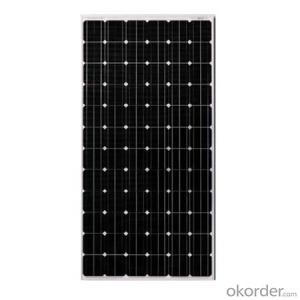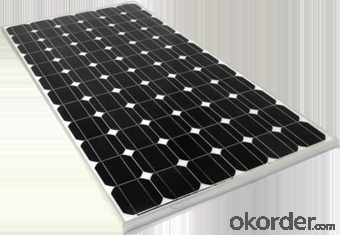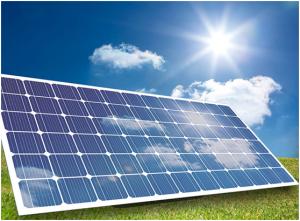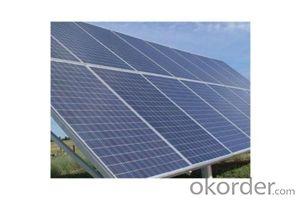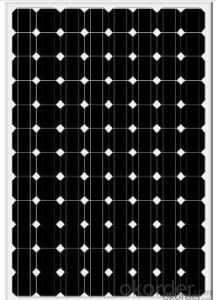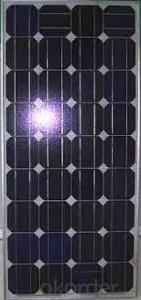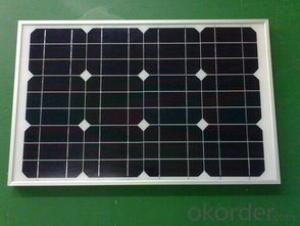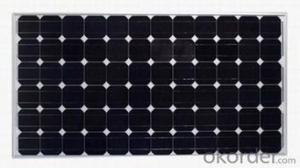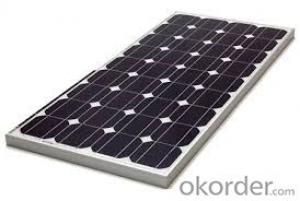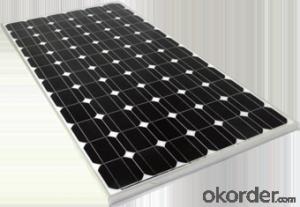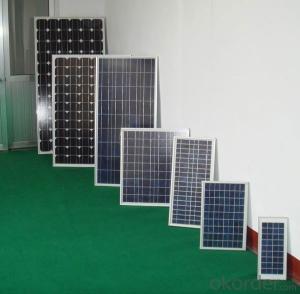Electric Car Charging Solar Panels - Hot Sale 10W to 185W Monocrystalline Solar Panel Factory Direct Sale CNBM
- Loading Port:
- Qingdao
- Payment Terms:
- TT OR LC
- Min Order Qty:
- 10 set
- Supply Capability:
- 300000 set/month
OKorder Service Pledge
OKorder Financial Service
You Might Also Like
Monocrystalline Solar Panel with 160W
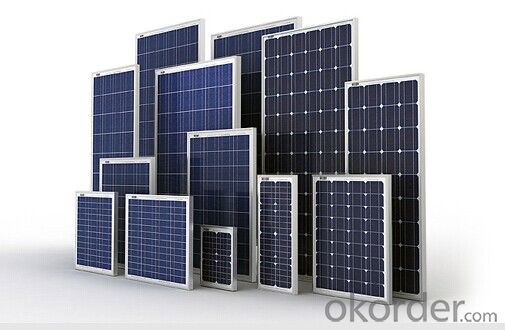
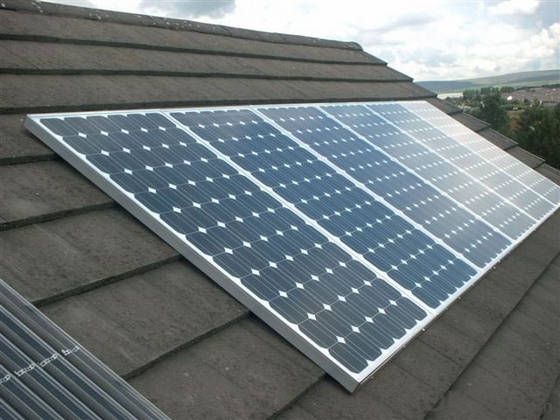
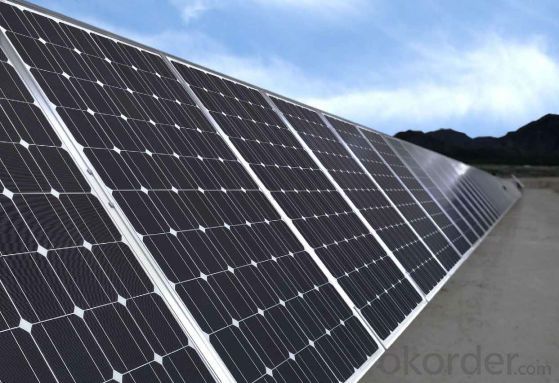
Monocrystalline Solar Modules
We offers a range of small, medium and large monocrystalline solar modules, designed for a range of requirements.
Specifications:
Tolerance | +/- 3% |
Cell | Monocrystalline silicon solar cells |
N0. of Cells | 72 (12 x 6) |
Dimension of Modules (mm) | 1581 x 809 x 40 |
Weight (kg) | 15.5 |
Limits:
Operating Temperature | -40~+85? |
Storage Temperature | -40~+85? |
Maximum System Voltage | 1000 VDC max. |
Hail Impact | Diameter of 28mm with impact speed of 86km/h |
Temperature and Coefficients:
NOCT | 48C+/-2? |
Voltage temperature coefficient (%/K) | -0.34 |
Current temperature coefficient (%/K) | 0.09 |
Power temperature coefficient (%/K) | -0.37 |
Characteristics:
Model: | SGM-160D | SGM-165D | SGM-170D |
Max-power voltage Vmp (V) | 34.5 | 35.4 | 35.8 |
Max-power current Imp (A) | 4.64 | 4.66 | 4.75 |
Open-circuit voltage Voc (V) | 41.75 | 43.6 | 43.32 |
Short-Circuit Current Isc (A) | 5.32 | 5.08 | 5.38 |
Max-power Pm(W) | 160 | 165 | 170 |
Model: | SGM-175D | SGM-180D | SGM-185D |
Max-power voltage Vmp (V) | 36.1 | 36.2 | 36.2 |
Max-power current Imp (A) | 4.85 | 4.97 | 5.11 |
Open-circuit voltage Voc (V) | 43.68 | 43.8 | 44.8 |
Short-Circuit Current Isc (A) | 5.49 | 5.48 | 5.51 |
Max-power Pm(W) | 175 | 180 | 185 |
STC: Irradiance 1000W/m2, Module temperature 25?, AM=1.5
Monocrystalline Solar Panels Specifications Range
Maximum Power (Pm) | Dimension | Weight | Operating Voltage (Vmp) | Operating Current (Imp) | Open Circuit Voltage (Voc) | Short Circuit Current (Isc) |
3W | 158x241x25mm | 0.5kg | 8.5V | 0.36A | 10.5V | 0.4A |
4W | 308x166x25mm | 0.77kg | 8.5V | 0.47A | 10.5V | 0.54A |
4W | 308.x166x25mm | 0.77kg | 16.8V | 0.24A | 21V | 0.27A |
5W | 296x215x25mm | 0.3kg | 16.8V | 0.48a | 21V | 0.54A |
10W | 286x406x25mm | 1.5kg | 16.8V | 0.59A | 21V | 0.66A |
12W | 286x406x25mm | 1.5kg | 16.8V | 0.71A | 21V | 0.8A |
14W | 286x541x25mm | 2kg | 16.8V | 0.83A | 21V | 0.96A |
16W | 286x541x25mm | 2kg | 17.2V | 0.93A | 21.5V | 0.99A |
18W | 296x541x25mm | 2.4kg | 18.8V | 1.07A | 21V | 1.2A |
20W | 296x641x25mm | 2.4kg | 17.2V | 1.15A | 21.5V | 1.24A |
24W | 541x451x25mm | 3.15kg | 16.8V | 1.14A | 21V | 1.56A |
26W | 541x451x25mm | 3.15kg | 17.2V | 1.51A | 21.5V | 1.63A |
30W | 296x966x25mm | 3.85kg | 16.8V | 1.78A | 21V | 2.03A |
36W | 541x641x35mm | 4.7kg | 16.8V | 2.14a | 21V | 2.4A |
40W | 541x641x35mm | 4.7kg | 17.2V | 2.33A | 21.5V | 2.5A |
55W | 1057x457x35mm | 6.6kg | 17.6V | 3.12A | 21.6V | 3.3A |
70W | 546x1196x35mm | 8.5kg | 16.8V | 4.15A | 21V | 4.7A |
75W | 546x1196x35mm | 8.5kg | 17.2V | 4.36A | 21.5V | 4.8A |
80W | 546x1196x35mm | 8.5kg | 17.6V | 4.55A | 21.6V | 4.9A |
110W | 1066x811x40mm | 11.8kg | 17.6V | 6.25A | 21.6V | 6.6A |
150W | 1066x811x40mm | 14kg | 34.4V | 4.36A | 43.2V | 4.7A |
- Q: i have to do a science fair project and thought it would be cool to make a solar powered vw bus. i have 2 6volt solar panels to power a dc motor that works off of 9v 2v or 8v. i also bought a 2nd motor because the first wasnt workin for us. this one is a 3v motor. ive had them in the sun but they wont work. please help, thanks
- Solar Dc Motor
- Q: Single crystal solar panels and polycrystalline solar panels
- Monocrystalline silicon cells in the laboratory to achieve the conversion efficiency of 24.7%. Ordinary commercial conversion efficiency of 10% -18%. Monocrystalline silicon solar cells because of the production process problems, generally its semi-silicon ingots for the cylindrical into, and then through the slice -> cleaning -> diffusion knot -> remove the dice -> the production of electrodes -> corrosion around -> Reflective film and other workers made of finished products. General monocrystalline silicon solar cells four corners for the fillet. Monocrystalline silicon solar cell thickness is generally 200uM-350uM thick, and now the production trend is to ultra-thin and efficient direction
- Q: If you were to shine, for example, heat lamps onto the solar panel along with the sun, will the solar panel eventually not work? Or will they produce more light as long as more light is directed onto them.
- Solar panels do not wear out the way machinery does. The semiconductors used give up electrons by receiving photons, and do not experience a net deficit of particles. However, if you placed a heat source such as a heat lamp too close to a solar panel, you could damage the panel by overheating it, which would denature the semiconductors or cause damage by scorching or melting. The problem would be the heat, not the light. Solar panels do have a finite life expectancy, though it is several decades under normal circumstances. The panels will eventually become scratched, warped, and dented. The electrical conductors will eventually be broken by metal fatigue as the panels heat and cool on a daily basis. So they will die of old age, but they don't wear out in an electrochemical sense.
- Q: I was wondering if they create other forms of energy besides electrical that is unwanted. Like heat due to the friction of something, or sound. Also why is a solar panel not able to collect 00% of the energy that is striking its panels. And how could the efficiency of this be hypothetically improved.
- figure it out for us
- Q: Do solar panels require a backup generator?
- No, solar panels do not require a backup generator. They generate electricity directly from sunlight and can store excess energy in batteries for use when the sun is not shining.
- Q: What would these solar panels power? For instance, my energy bill shows 2035kWh for last month. How much would this remove from that if it outputted full power? Thanks!
- A solar panel that is rated at 60 watts would produce that amount under the most favorable conditions of direct sunlight at noon in a good location. This would taper off to nothing at the beginning and ends of the daylight. A 60 watt Panel operating at full output for hour would produce 60 watt hours. If we assumed a straight line of output from zero to 60 watts and back to 0 again over 6 hours the average output would be 30 watts x 6 hours = 80 watt hours / day x 365 days = 65700 watt hours in a year / 2 = 5475 watt hours in a month. You lose about 0% converting from DC to AC. This reduces this to about 4927.5 watt hours. Your bill is measured in KW hr which are 000 times bigger. This is 4.9275 KW hr or .24% of your last month's bill. At a national average of about $.2 per KW hr the energy out put for one month would be equal to about 60 cents.
- Q: ok so when a solar panel is marked as a certain wattage dose that mean it makes that much in a day in an hour or constant, dose it still work at night or what ? is it worth it or is it more of a pain? can some one tell me what all the watts and volts mean ?? and can some one tell me what a kilowhat is in refrence to some thing i understand like howmany loads of laundey can you do wt a watt? i need help understanding this stuff?
- Create okorder /
- Q: How do solar panels perform in cloudy weather?
- Solar panels can still generate electricity in cloudy weather, although their performance is reduced compared to sunny conditions. The panels are able to convert diffuse sunlight into electricity, but the amount of energy produced will be lower.
- Q: Can solar panels be used for charging electric vehicles?
- Yes, solar panels can be used for charging electric vehicles. Solar panels convert sunlight into usable electricity, which can then be used to charge the battery of an electric vehicle. This enables vehicles to be charged with clean, renewable energy, reducing both emissions and dependence on fossil fuels.
- Q: Its cloudy out and i have a solar panel that has 3, .5 volt cells But how do i charge it without sun any other ways?
- Haven't you watched the Truman Show? Just cue the sun...
Send your message to us
Electric Car Charging Solar Panels - Hot Sale 10W to 185W Monocrystalline Solar Panel Factory Direct Sale CNBM
- Loading Port:
- Qingdao
- Payment Terms:
- TT OR LC
- Min Order Qty:
- 10 set
- Supply Capability:
- 300000 set/month
OKorder Service Pledge
OKorder Financial Service
Similar products
Hot products
Hot Searches
Related keywords
